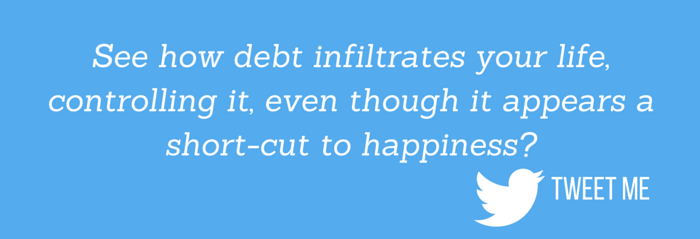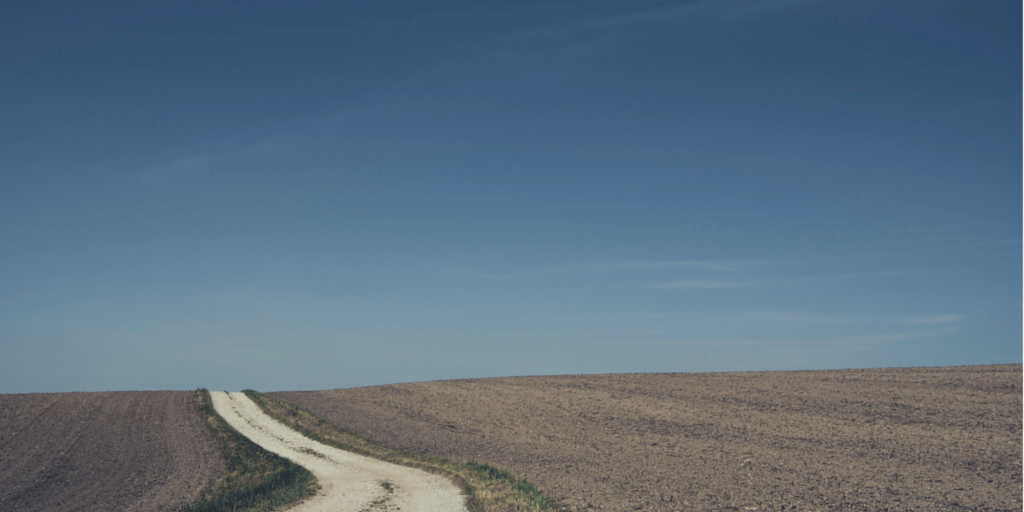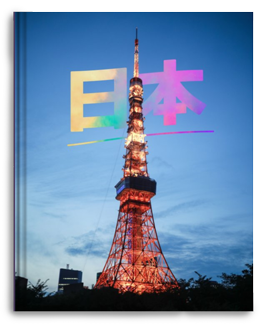
THE BLOG
5 Tempting Money Traps to Avoid: Simplifying Your Finances.
How many of us want to admit, out loud or to ourselves, that we are in debt? How many of us want to admit why and how we got there?
5 Tempting Money Traps To Avoid: Simplifying Your Finances.
I might only be 25 but I am no stranger to consumer debt.
I am no stranger to the feeling of being weighed down by financial burdens, and the accompanying guilt of knowing I more or less created them on my own.
But how many of us want to admit, out loud, or to ourselves, that we are in debt?
How many of us want to admit why and how we got there?
Some of us can't blame our debts on having too many bills to pay. Some of us just let things get a bit out of control in the pursuit of entertainment, escapism and the thrill of acquiring new things. I was doing the latter and that's how I got into debt.
You can read my full debt story, but here's a brief breakdown of my situation:
- 3 1/2 years ago I had credit cards nearly maxed out.
- I was 900 pound into an overdraft.
- I had a brand new car on finance.
- I was in a job I wasn't enjoying.
- I was headed for financial disaster.
I was stressed and miserable. I had left one job for another, hoping it would be a fresh start of some kind. It turned into a fresh nightmare.
I worked quite hard but didn't earn a lot of money for what I did. I didn't feel like I could repay my debts from the previous year and maintain a good standard of life on that income.
And eventually I just gave up on the job, and that made my situation even worse.
I had created my own stress and problems. I was the maker of my own misery.
To this day I blame no-one, not even my manager at that shitty job, for the fact I ended up unemployed, direction-less and with my savings going depleting by the day. I didn't feel poor however. I still believed in the 'free money' of credit cards and continued to add to my established debts.
I went out and spent money buying things I neither needed nor truly wanted.
But at some point I questioned, why should I have a wardrobe full of pretty things if I was actually being buried alive by them.
Having an abundance of stuff served as evidence of what my debts had funded, the happiness those things hadn't brought me, whilst I had very little in the bank to show for my months of enduring a crappy job or to even make ends meet.
It really seemed like an impossible situation with no way out.
It's time I don't remember fondly, but I do remember and share, because it taught me a lot about financial sense.
Travelling was a goal that drove me to pay off debts and save, but you don't need a big life change to motivate you.
You might be embarking on a new career path, or trying to save for a big holiday, but first you want to start afresh and be financially solvent.
You can seek freedom from the stress and weight of debt by avoiding these 5 tempting money traps.
Like what you're reading?
Join our email gang for bonus content and conversation!
CREDIT CARDS
I think people often use these to cover shortfalls during times of difficulty, but I also think people get these when they actually have a good income.
They feel safe in the belief that credit spending is a debt they can repay easily each month.
What we often forget is that rent, food and bills is often enough of a financial commitment, and can already create a lot of stress each month. Bringing a credit card into the mix may lead to unnecessary hardship at some point down the line.
Then again having a credit card that you aren't using may be an essential at some point in your life...
It's a game of 'What If's':
What if you lose your job?
What if you decide to change your career?
What if a major financial drain occurs, like a car repair or health issue?
If you already have high credit card debts, then you can't use that credit card to help you in the above scenarios.
If your income suddenly drops, your existing debts will still continue to rise. If you happened to get one of those credit cards with a deal of no interest for a certain period, eventually that period will end, and your debt could get out of control.
I only advise this cautious approach to credit because I myself was stung by improper credit card use. I lost my job, I had a health issue and I had bills to pay, so I really could have done without a large lingering debt.
OVERDRAFTS
Much like credit but more often used to cover everyday spending, I really believe these can be 100% avoided with a little forethought.
Do you manage to make your general expenses every month on your current income?
If not, is your overdraft your only option, or could you make some minor cutbacks here and there to avoid it?
Do you need subscriptions to all those film/music streaming sites?
Do you buy food off-brand and avoiding eating out?
Could you temporarily use a small part of your savings to cover an unexpected short-fall, replacing that money as and when you can?
I think people see an overdraft as a much lesser evil than a credit card. In which case they can be extremely helpful, especially the nearer to payday it gets. But they aren't a long-term solution because in continuously using one you are allowing yourself to live beyond your means and taking yourself further away from your main financial goals.
My overdraft was the pre-cursor to my credit-card so it really can be a gateway to more financial over-stretching.
CAR FINANCE
A few years ago, I wanted a brand new shiny car.
I decided that being a graduate, in a job, in my mid-20's, I deserved one.
I knew nothing about car finance and when I did find out about it I wasted no time in ordering a little fiat 500.
I loved that car, but I didn't love the fact I had to get rid of it a year later, since I was unemployed, starting a new business and no longer able to afford it.
I had to find someone who would buy it, but first I had to find money to pay off the finance and then wait out a car buyer.
I have learnt from this, and in the future, I will only ever purchase a car out-right with savings.
I know that my approach as a minimalist means I no longer value having the latest and most expensive thing, over just having something solid that works, but with car finance, you need to weigh up the value a brand new car brings versus the cost and commitment long-term.
Could you purchase a perfectly attractive and safe car with your cash savings, instead of paying a large amount of money each month in repayments to a car company?
Might it be more important to have something reliable and cheap, if it means you can live your life how you want to, without exorbitant financial stresses added to the equation?
If you haven't got the savings and see finance as the only way to overcome that, could you look at buying a cheaper car and borrowing money from a close family member?
Could you temporarily seek alternative means of transport, until you do have the savings to buy a car outright?
In my experience, car finance can work out, but only in ideal circumstances, where your lifestyle or priorities don't suddenly change.
I couldn't have foreseen that I'd go from gainfully employed, to unemployed, and then self-employed. If I hadn't taken out car finance, my sudden life changes wouldn't have mattered so much.
I would have had more freedom to quit the crappy job that paid the bills and chase my self-employment goals.
PAYDAY LOANS
We all believe we have a valid reason for taking out a loan, be it for a new car or holiday.
In recent years there's been the more worrying rise in the use of payday loans specifically, which often come with unbelievable APR rates. People can end up repaying 3 times what they originally borrowed.
Traditional loans come from our culture of wanting something we can't afford, immediately, without much time or effort to acquire it.
Payday loans are very much routed in that desperation people feel toward the end of the month, nearing payday, when they have a bill to pay that they either didn't budget for or didn't expect.
A loan might give you something quickly, but the debt it leaves you will not be so quick to deal with. It will take time to clear and whilst you are clearing it you will be financially limited and restricted.
A payday loan will be a slippery slope, not merely because of the steep APR rates but also because you might end up not repaying it as soon as your salary comes in. It very much feels like a credit card, e.g., free money.
You might delay repaying it because when your salary does arrive, you will feel a lot richer than you normally do, but its not reality; the reality is that you can't escape the payday loan, because it's just that, only designed to get you to payday and then be returned.
Fundamentally both types of loan will add to the stress you experience on a monthly basis, especially around more expensive times of the year, or if your income is unpredictable.
BUY NOW, PAY LATER
There are deals these days that allow you to put off paying for something, creating this kind of illusionary purgatory, where you get to enjoy something without financial repercussions.
But quite often these deals involve a fair bit of interest and high charges if you miss a payment.
You could end up even forgetting about these financial commitments due to the delayed repayments and that could lead to unplanned short-falls.
There are sometimes fee's attached to making full repayments early.
It seems like a really great option, but you need to look at the fine print, the figures and the negatives.
Can you source the thing you need 2nd hand, cheaper, or even for free?
Is the item you want worth the long repayment commitment?
If you are looking for a household item, look online first to try and find affordable options that don't require this kind of financial commitment.
The common thread that runs through all these financial traps is our culture of wanting things that are beyond affordability, but are made so thanks to credit deals etc.
Once upon a time people lived within their means, and would save for months on end to buy luxury items.
One argument against this is that life is short and we should try to enjoy it, whatever way we wish to, right away. Then again a life built around instant gratification and material obsession is a never-ending (and stressful) endeavour.
Our society is built around creating new wants and desires constantly, so you won't just get into debt once, for that one special object or life goal; it will probably happen again and again as new things and options appear in front of you regularly.
You could end up spending most of your life owing money. Thus you'd spend most of your life committed to creating the income to serve those debtors, not to serve your personal dreams and goals.
Thanks for reading!
Hannah here, one half of NomaderHowFar. I love reading, the beach, proper English chips, and a good cup of tea. But I mostly like to chat about minimalism, simplifying your life, the beauty of travel and sometimes I get a bit deep. Get to know us here!
Want More?!
The D Word: Hannah and DEBT are DONE!
I feel like all the big 'D' words are always bad things that people don't like talking about i.e. Divorce, Death, Dentists. I suppose not everyone likes to air their financial laundry in public but I am an open book...
The D Word: Hannah and DEBT are DONE!
UPDATED POST: This post is from 2014, when Hannah finally cleared her debts and was able to begin saving up for our travels in Australia. In 2016 we remain debt-free nomads!
YAY!! No other word so majestically describes the feeling of finally being debt-free.
I did mention in a previous post that June would be a big month for me as I would finally clear my debts; debts in the form of a student overdraft and a credit card.
So here it is, June 2014, and I have paid everything off. I am now debt-free!
I feel like all the big 'D' words are always bad things that people don't like talking about i.e. Divorce, Death, Dentists.
I suppose not everyone likes to air their financial laundry in public but I am an open book; and I write a travel blog about minimalism and living a fulfilling life on a small budget. I have to be a good example to all our readers of course. Which is why I wanted to share this milestone, to inspire and enthuse everyone else, who is trying to eradicate their debts.
Clearing debts is not so easy for the likes of us who are self-employed or part-time employed, as it might be for people earning the big bucks.
But it's probably just as difficult for those on a hundred grand a year as it is for those on ten grand!
Why? Because we generally adjust our lifestyle to our income, and plenty of people become quite accustomed to a life of luxury when it becomes affordable; sometimes wealthier people who feel more financially secure and actually accrue a lot of debt (despite a high income) in order to go for the bigger, better, more expensive; the house, the car, the holiday, the new kitchen extension.
But I doubt these people are the same whom might be wanting to ditch material possessions, escape the trappings of 9-5 society and go all nomadic.
Maybe they are! Who am I to generalize, we can all become tired and disenchanted by our lives and want to enact big change.
- Choosing to leave behind the 9to5.
- Embracing minimalism to let go of my material obsession.
- How travel turned out to be the best thing I have ever done.
- Where my dreams have brought me today.
Either way, I am proof, that despite living on a low and unpredictable income (my tax return for that period showed that one month I earned £1000, the next only £500, all whilst paying out £100's on fuel) I still got myself out of debt in the space of 7 months.
7 months, it really has gone by so fast.
I so clearly remember envisioning this time; it seemed so far away but so exhilarating, because I was determined, and I knew I was going to get here, with time and pressure. Not to say I haven't slipped up, because I certainly have.
On one occasion I went to my local town to buy 'a couple of new tops' and spent way more than I had intended. I am not perfect but I have still come along way.
My top three realistic suggestions for debt clearing:
1. Always Question.
When you are in a shop, holding something, weighing up buying it, is it a NEED or a WANT; is it something that will be useful and that will last?
Is it worth the expenditure when that money could be elsewhere clearing debts quicker?
If the answer is YES, then to maintain balance you'd need to spend less in the coming days/weeks after making the purchase.
Is this sacrifice now, worth further sacrifices later?
Is the item going to bring instant gratification or long-term satisfaction?
People waste their cash and then don't repay their debts as fast as they'd like, when they consistently spend money on random and useless stuff.
Buying a good-quality pair of trainers is not a spending sin, but buying a new pair each week? Buying duplicates of things simply because you enjoy the new and trendy?
There is no room for excess and luxury when it comes to debt clearing!
2. Don't let disposable funds sit in your current account or wallet.
A sure-fire way to accidentally (on purpose) spend your cash is if you leave it sitting there in your wallet or debt account, tempting you with it's come-hither papery pull.
I always move my funds away, either straight toward my debts, bills, or into a savings account which isn't linked to my debit card, so that I can't waste that money on day-to-day life.
If I am using a cash method (leaving debit cards at home) that week to pay for my groceries, I will resolve that I can't then touch my debit card to pay for food.
If I frivolously blow this cash, I also then can't eat for a week...the way I organize my money has actual painful consequences, so I manage it more strictly.
I move funds for each bill into a specific bank account and I do the same with spare cash, but I usually just send it into the black hole of debt straight away and then I can't feel the loss of that money too acutely.
When I would get a large influx of cash, say, when a customer pays an invoice, if I can spare that money and if it isn't required for bills, I don't then view that as play money, instead I send it straight to the debt!
I believe extra cash influxes aren't truly yours to enjoy whilst debts linger over your shoulders.
3. Always look for the best deals.
When I do my weekly food-shop I always buy the cheaper version of what I need.
I do try to buy healthily and organic where possible, but I will help my bill with buying the cheapest meal staples plus buying frozen fruits and veg.
I always take a list to the shop with me, which is based on a meal-plan I would have designed the previous night.
I account for snacks and a few treats also within my meal plan. If you have nothing in the house to eat, the temptation to head and out spend outside your budget will be your undoing!
I also always write on my list what I already have at home to prevent extra wasteful spending.
Other ways to maximize debt repayments:
So here I am.
I have reached this pivotal moment when I can enjoy the relief and bask in the fruits of my labours. Now, I get to watch my savings mount up, knowing each earned penny is all going toward an awesome, life-affirming travel adventure. My money is now going to work for my goals and my dreams, as opposed to making me feel enslaved by its pull and the push to consume mindlessly.
Of course I'm not yet rich, I am merely unburdened by debt, and I won't get too far travelling on a couple grand, but I will get to Australia with my gorgeous partner within a few months, and that makes all the sacrifices feel so justified.
Thanks for reading!
Hannah and Taran here. We hail from Southern England, where we met online and are now realizing our mutual passion for travel here at Nomad'erHowFar. We discuss Nomadic Living, Simplifying your Life and Long-term Travel, to empower, motivate and inspire our readers. Get to know us here!
Get social and follow us across the web!
WANT MORE?
















